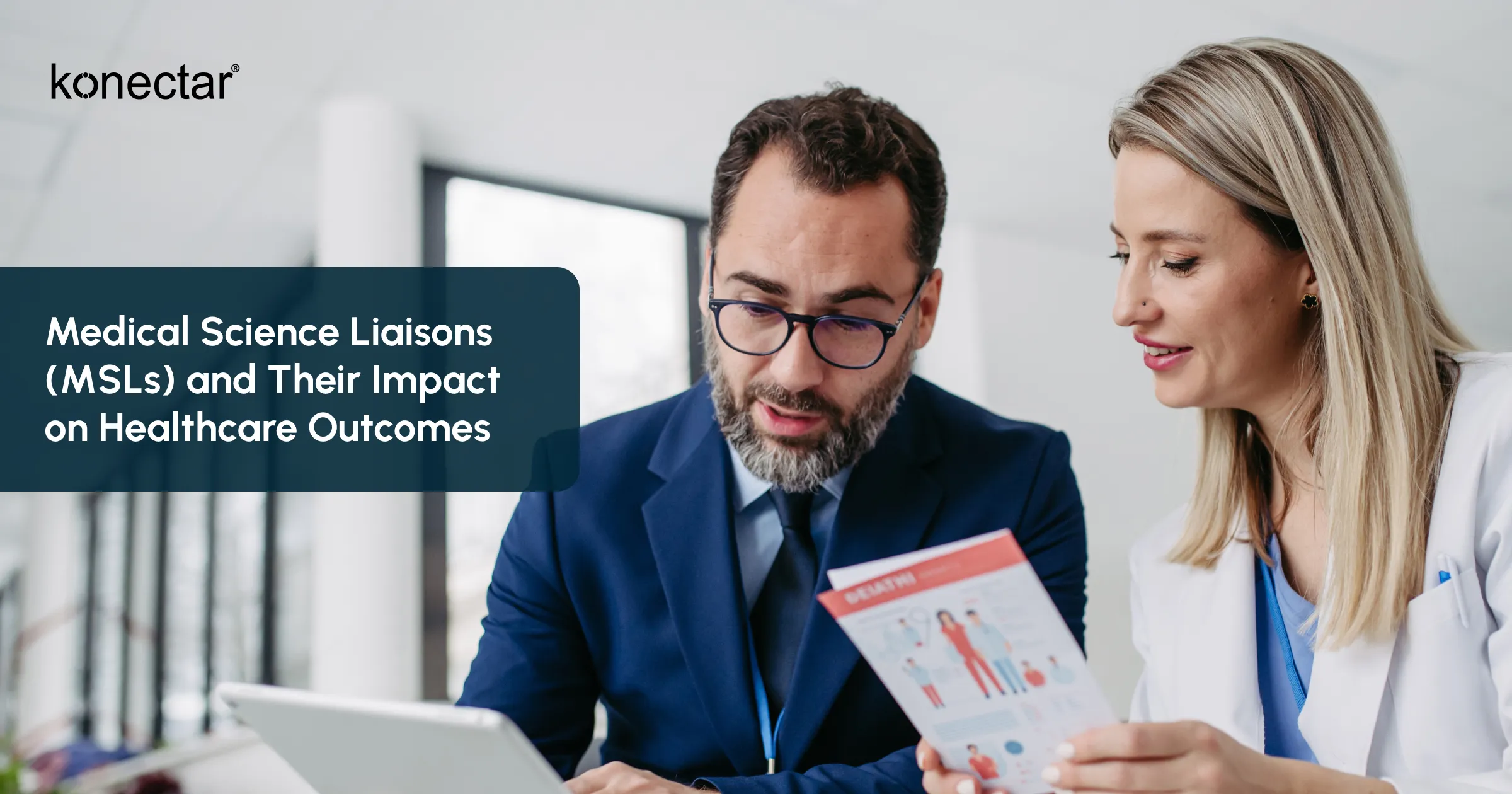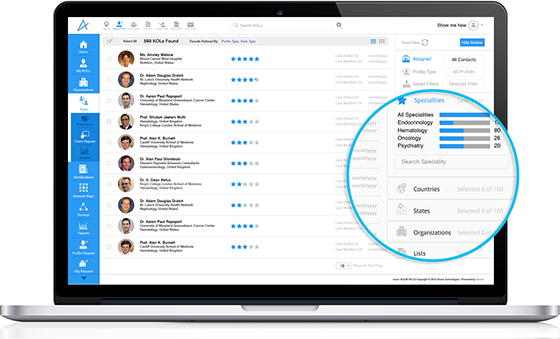01-10-2024
Medical Science Liaisons and Their Impact on Healthcare Outcomes

Medical Science Liaison (MSLs) are field professionals who work in pharmaceutical, biotechnology, and medical device companies. These experts also work closely with other stakeholders within the United States' medical system and internationally.
Typically, MSLs are highly knowledgeable experts in their therapeutic areas, such as internal medicine and advanced internal medicine. Such expertise enables them to excel in their multifaceted responsibilities. One of these key responsibilities includes engagement with Key Opinion Leaders (KOLs) and other Healthcare Professionals (HCPs). MSLs typically meet with KOLs at their primary care offices, medical institutions, and at conferences.
As such, their impact creates ripples throughout the system, reaching all the way to the individual patient.
In this article:
- Roles and Responsibilities of MSLs
- The internal Stakeholders of MSLs
- The External stakeholders
- MSLs and Digital Transformation
- Challenges faced by MSLs
- Conclusion
- FAQs
Roles And Responsibilities of MSLs
MSLs have several roles and responsibilities that have slightly different outcomes when interacting with different stakeholders. Their network expands to physicians, primary care healthcare professionals, academic institutions, and patient groups.
They also engage with functional medicine specialists, reflecting the growing diversity in therapeutic approaches.
The Internal Stakeholders of MSLs
Medical Science Liaison and Medical Manager
MSLs and Medical Managers work closely together to drive both clinical and business outcomes within healthcare organizations. MSLs gather and provide critical scientific insights, clinical trial data, and real-world feedback from HCPs.
Medical Managers rely on to shape business strategies. This collaboration enables medical managers to develop evidence-based strategies, plan effective product launches, and position products accurately in the market.
Medical Science Liaisons and Brand Managers
Medical Science Liaisons (MSLs) and Brand Managers collaborate closely to ensure a product's success throughout its lifecycle. Brand managers use information provided by MSLs to shape effective marketing and product strategies.
Brand Managers can better understand market needs, patient outcomes, and therapeutic advancements in areas such as general medicine. With this knowledge, Brand Managers can tailor marketing messages, design promotional campaigns, and create strategies that resonate with stakeholders.
Medical Science Liaisons and Regulatory Affairs
Regulatory Affairs is responsible for ensuring compliance with the legal framework of the governing authority. They must ensure compliance at every stage of product development, at the marketing level, and in distribution. These documents relate to product safety, efficacy, and quality standards.
The External Stakeholders of MSLs
MSLs’ communication and engagement with external stakeholders set them apart from other overlapping job titles in healthcare.
MSLs and KOLs & other Healthcare Professionals
MSLs rely heavily on the expertise of KOLs to stay informed about the latest developments in their therapeutic areas. By engaging with these experts, MSLs gather crucial feedback on products, clinical trials, and patient treatment outcomes. This helps pharmaceutical companies adapt their strategies based on real-world data.
KOLs benefit from the scientific knowledge that MSLs bring from within the company, including insights into medical procedures.
MSLs and Academic Institutions
MSLs focus on Academic Medical Centers (AMCs) to identify and build relationships with KOLs. AMCs play a critical role in the healthcare ecosystem, serving as hubs for cutting-edge research and expert knowledge.
By engaging with these professionals, MSLs can tap into valuable insights and foster collaborative opportunities.
MSLs and Patient Advocacy Groups
The collaboration between MSLs and Patient Advocacy Groups (PAGs) is critical for advancing patient-centered healthcare. PAGs represent the collective voice of patients, advocating for their rights, providing support, and sharing insights into their experiences. This valuable information is an essential resource for MSLs.
MSLs leverage the information gathered from PAGs to influence drug development, treatment plans, and personalized medicine approaches. They also help ensure that patients have access to innovative and evidence-based healthcare solutions.
MSLs and Digital Transformation
Advancements in healthcare have fast-tracked our progress by at least a decade. And that is just the beginning. The newest technologies are making things possible on a wider scale and for various professionals. For MSLs, whose functions are dual-fold (gathering and disseminating information), such innovations are making remarkable strides.
KOL Interaction: One of the key functionalities of MSLs is interacting with relevant KOLs.
konectar enhances this process by enabling MSLs to target KOLs based on specialty, region, and affiliations. In addition to streamlining the identification process, konectar allows MSLs to track and document their interactions with KOLs.
Adopting digital tools and information technology in healthcare allows MSLs to function optimally. You can learn more here.
Personalized Medicine: With the emphasis on individual medicine, the newest trend has been the emergence of functional medicine doctors. These types of professionals differ from traditional medical doctors in their focus. A functional medical doctor takes an integrative and holistic approach to patient care.
Value-based Care: Personalized medicine is making the possibility of value-based care in healthcare a reality. A value-based model of healthcare is a patient-centered approach that improves patient outcomes. MSLs contribute to making this a practical model by sharing their expert knowledge and clinical insights from KOLs.
Challenges Faced By MSLs
The role of MSLs is quite expansive, but it's not without its accompanying challenges. Some of these include:
Adapting to New Ways of Communication
Much of the communication process has undergone a major overhaul in favor of technology. The conventional methods of identifying a KOL, approaching them, and engaging with them are now facilitated via digital tools. Proficiency, combined with a sound knowledge of healthcare solutions, can set professionals apart.
Vast Amounts of Data Points
Becoming an expert requires drawing from multiple sources, a key responsibility for any MSL professional. They need to be proficient not only in their subject knowledge but also in staying up-to-date with recent trends. This flooding of information can be overwhelming.
Travel Frustrations & Scheduling Conflicts
The work of an MSL and travel go hand-in-hand. MSLs often have to work around complex schedules at primary care offices and other healthcare institutions. Finding the right set of physicians and scheduling time with busy physicians remains a significant logistical challenge for MSLs.
Specialized Training
An MSL must adopt and understand the medical jargon, abbreviations, and manner of speaking. In addition to industry knowledge, they must possess excellent communication skills, presentation skills, emotional intelligence, and a sharper and more detail-oriented mindset.
Usage Of The Right Technology
Choosing and implementing the right technology plays a significant role in the functioning of MSLs. One of their primary responsibilities is identifying and engaging relevant KOLs. This process can be cumbersome when done manually across large regions. In such cases, technology provides a significant advantage, allowing for more efficient and accurate KOL identification.
With the increasing integration of health and technology, MSLs can use digital tools to streamline these processes for convenience.
Conclusion
The role of MSLs cannot be understated, especially in the United States. They are becoming a vital part of the healthcare ecosystem. As the world enters the post-pandemic era, advancements in medical technology will play a key role in the profession of MSLs.
FAQs
- What is a Medical Science Liaison?
A medical science liaison is a specialist in the healthcare landscape who is primarily a field-based professional. These individuals have the critical task of communicating with internal and external stakeholders in the healthcare ecosystem.
- What are the primary responsibilities of an MSL?
MSLs have the complex task of gathering and disseminating medical information to HCOs, HCPs, Medical Advisors, Medical Managers, Academic Institutions, and Patient Advocacy Groups.
- How do MSLs influence healthcare outcomes?
MSLs influence health outcomes through their interactions with internal and external stakeholders in the healthcare industry.
- Who are the internal stakeholders of an MSL?
An MSL has to engage with internal stakeholders, including Medical Advisors, Medical Directors, Brand Managers, and Regulatory Affairs teams.
- Who are the external stakeholders of an MSL?
The external stakeholders include Healthcare Professionals (Medical Doctors, Functional Doctors, physicians), Healthcare Organizations (HCOs), Academic Institutions (hospitals and universities), and Patient Advocacy Groups.
- Do MSLs travel a lot?
Yes, approximately 70% of the time, an MSL is involved in traveling. That percentage may vary from person to person, depending on their level of expertise and age. And remember, this is a field role.





